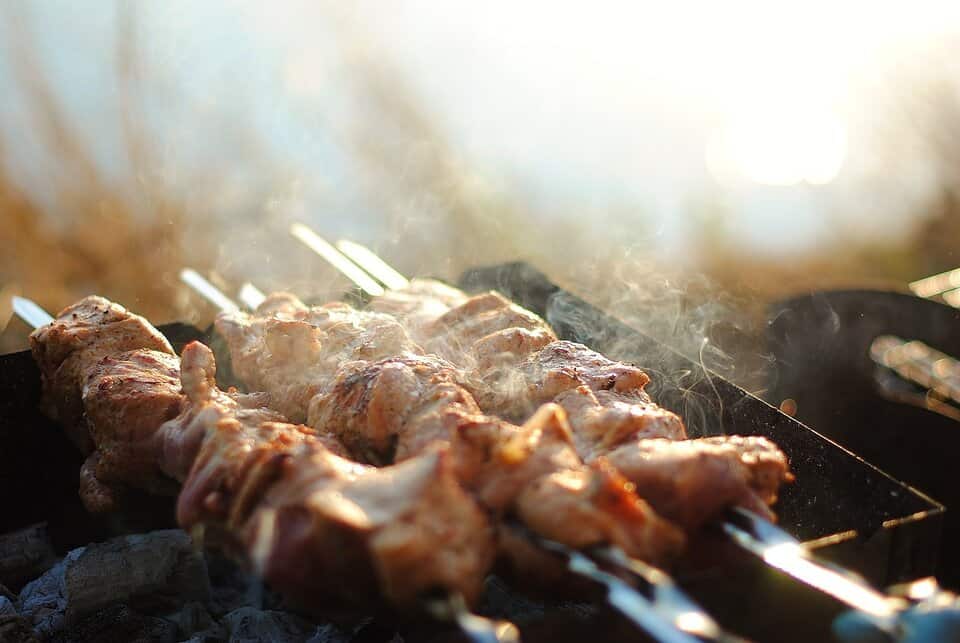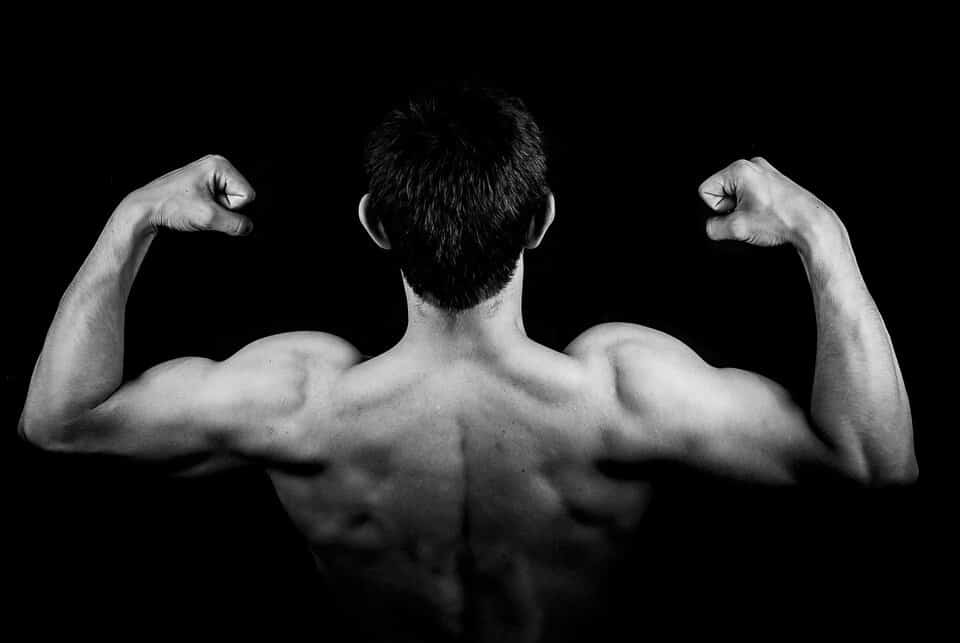Kebabs are an amazing food, and I’m not surprised at all that they’ve become so popular in so many places. Honestly, I’m just surprised it’s taken this long for them to catch on! While this is a delicious and filling fast food option in the case of a Doner Kebab or a healthier alternative to McDonald’s when looking at a grilled skewer, it’s also worth nothing that kebabs have become very popular among lifters who want to bulk up.
Gaining weight in order to gain muscle isn’t easy, and body builders, athletes, or just normal people looking to bulk up a bit to look and feel better about themselves want to know if these tasty meals can still be part of a diet designed for adding on the muscles while bulking up or not.
Most people know that most kebabs are packed with protein and calories, which in theory makes them ideal for a meal plan where you need plenty of both to add muscle.
Generally speaking kebabs are an excellent option for bulking up due to the combination of calories, protein, and fat or carbs. However, kebabs must be part of a larger bulking plan instead of the cornerstone.
When it comes to bulking, you need to look at the opposite of diets for weight loss. You want a higher calorie intake, large amounts of protein, which combine for building muscle, and enough carbs to give yourself energy to exercise without eating away at your muscles.
The type of kebab is also going to matter a lot. Chicken and beef kebabs are high in protein, while vegetables like peppers and onions can add extra nutrients, as can mushrooms. For those rare salmon or fish kebabs, you would need to eat even more as fish has much lower calories than those other mentioned meats and much fewer than the conventional kebab sausage.

Are Kebabs Good for Bulking?
There are many people looking to bulk up, (and who doesn’t like a few more muscles?) and finding foods that are
- High in calories
- High in protein
- Taste delicious
- Fit into a regular eating plan
Whether or not kebabs should be the focus of a bulking plan is up for debate, however they have many of the key ingredients needed to make an eating and training bulking regiment work.
However, it is important to understand that kebabs should only be a part of a larger bulking plan and should not be relied upon as the sole source of nutrition. That said, kebabs are a great fast food option, especially compared to many popular fast food options that are much less healthy and don’t have the same amounts of protein.
Why Are Kebabs Intriguing for Bulking?
One of the main reasons why kebabs are considered a good option for bulking is because they are typically high in calories. A typical doner kebab can contain anywhere from 600 to 800 calories, with around 40 to 60 grams of protein, 30 to 50 grams of carbohydrates, and 20 to 30 grams of fat. This makes it a good option for those who are looking to increase their daily calorie intake in order to support muscle growth.
However, it is important to note that kebabs are not a particularly healthy food option, and they should not be consumed on a regular basis. The general problem therefore isn’t with too much fat or carbs in the case of a Doner kebab, but it’s the fact that the majority of kebabs are high in sodium, which can lead to high blood pressure and a wide variety of other health problems.
High salt is never a good thing, especially if you are shooting the blood pressure through the roof before working out and lifting weights, all activities that put a physical stress on the body. In addition to that, many kebabs are also high in saturated fat, which has been tied to a host of potential heart problems and other health issues.
When it comes to bulking, it is important to focus on consuming a balanced diet that is rich in protein, complex carbohydrates, and healthy fats. This is a combination that gives energy and fuel for growth and while kebabs can be a good option for increasing calorie intake, they don’t cover these needs perfectly, and generally speaking they should be consumed in moderation.
So as part of a bulking plan – great. But only as one part of a much larger, well-rounded plan.

So Just What Are Kebabs?
Kebabs are a popular dish that originated in the Middle East and have spread throughout the world. They typically consist of meat, vegetables, and spices that are skewered and grilled. The meat can be beef, lamb, chicken, or even fish, and the vegetables can include onions, peppers, and tomatoes.
There are dozens if not hundreds of different kebab recipes out there, although most fall into a couple dozen types with shish kebabs, skewers, and Doner kebabs being among the most popular by far, at least from a worldwide popularity standpoint.
Kebabs can be served with a variety of sauces and sides, such as pita bread, hummus, and tzatziki. This is how one kebab can look like a grilled chicken skewer while another one can look like a pita bread taco with sausage slices for filling. Those are two pretty different pictures but both can accurately be called kebabs.
Keep this in mind when looking at kebabs for bulking purposes as the meat, ingredients, and preparation can vastly change the average nutrition (especially the calorie and protein) numbers.
Type of Kebab Matters for Bulking
When it comes to bulking, the type of kebab you choose can make a big difference. Some kebabs are high in calories and protein, making them a good choice for those looking to bulk up. However, others may be high in fat and carbs which is okay in and of itself but it’s a problem if your exercise isn’t strongly dialed in.
Example: A doner kebab is a popular type of kebab that is often sold in fast food restaurants. While it can be high in protein, with about 40-60g per serving, it is also high in calories, with about 600-800kcal per serving.
This can make it difficult to consume enough calories for bulking without consuming too much fat and carbs. That is part of the balance that weight lifters at all level need to think about.
On one hand, a chicken kebab can be an excellent choice when it comes to bulking, as these tend to be lower in calories and fat than most other types and styles of kebabs. Yet they are absolutely packed with protein which makes them an excellent choice to make sure there’s enough protein in your body to fuel your muscle growth.
Eating a kebab isn’t going to bust your bulking efforts. In fact, it can be a good addition of calories and protein if you’re a little short of either throughout the course of your day.
Calories in Kebabs
Calories are key when it comes to bulking. While this could be argued to some extent for losing weight there’s no argument about the role calories play when bulking. They are a very necessary part of the process because your muscles need those in order to build up more.
Adding in protein with exercises is what directs them towards muscle growth versus fat. Because of this the facts that kebabs have a lot of calories is not a negative when it comes to bulking up. I wouldn’t build a bulking plan around them but I wouldn’t feel bad about grabbing a kebab snack.

How Many Calories are in Kebabs?
The answer to this question is going to vary based again on the type of kebab. A skewer of grilled chicken is going to be much different than a large piece of pita bread with a cucumber and ranch sauce over sausage.
Because of that, getting exact information can vary and should be done on case by case basis. To give just an idea of how big the difference can be, using the Livestrong resource:
- 100 gram chicken kebab is 79 calories
- 100 gram lamb kebab is 223 calories
That’s a massive difference, and many kebabs aren’t exact measured so they are likely at least a little bit above 100 grams. Add in different sauces, and if you charted these on a graph, the separation between the two lines would just get longer and longer.
Add in the worries about salt and sodium and there’s good reason to be at least cautious about having too many of these even if you are short on calories and protein.
So if you’re bulking, or even if you’re not, eat kebabs in moderation and don’t get too carried away. Too many would be a bad thing even as part of a balanced bulking diet.
Protein in Kebabs
Protein is the cornerstone of nutrition when it comes to all your bulking efforts. I’m sure anyone reading up on how to build muscle is sick and tired of hearing about protein, but it’s so important that it just can’t be ignored.
Since all kebabs come with a solid serving of meat, you should never have any problems adding to your daily protein by stopping to grab a kebab as a snack. You could even ask for extra meat if you want, though depending on the type of kebab I’m not sure how well that would work.
How Much Protein is in Kebabs?
The amount of protein in kebabs can vary depending on the type of meat used and how it’s prepared. The most common options are chicken, lamb, pork, beef, and sausage. According to American-Supps, a typical kebab can contain around 40-60g of protein, depending on the size and type of meat used though once again, this can vary depending on the type of kebab.
Even though it’s not directly tied to protein, if you can choose kebabs that use grilled chicken or organic lamb versus heavily processed meats and sausages that is better for your overall health while bulking up.
That said I can’t emphasize enough to consume these in moderation and to not worry about one as a snack here of there but don’t make these a mainstay.
How Do Kebabs Compare to Grilled Chicken for Bulking?
Grilled chicken is often considered a staple food for bodybuilders due to its high protein content and low fat content. But what about kebabs? Can they be a replacement? A supplemental snack? Support food for a larger bulking diet plan?
The long answer is that nothing dethrones grilled chicken as the king of proteins for bulking. It’s a huge amount of protein for a reasonable amount of calories, it’s clean calories, and it super fuels muscle growth.
While kebabs can be a great change of pace snack, can add in additional protein and calories, they’re not going to dethrone chicken as being the mainstay of a good muscle-building diet.
Kebabs for Bulking: What’s The Verdict?
Overall, kebabs can be a good option for bulking due to their high protein and calorie content. However, it is important to keep in mind that they should only be a part of a larger bulking plan that includes a balanced diet and consistent exercise. Without the right weight lifting programs you’re not going to be able to challenge your muscles enough to bulk up.
If you want to add in the occasional protein skewer or kebab to aid in bulking up, go for it, but don’t make this a daily or multiple time a days habit as the benefits kebabs can give to bulking don’t out-weigh the negatives that would happen from eating these endlessly.
Additionally, relying solely on kebabs for bulking is not recommended. A well-rounded diet that includes a variety of protein sources, complex carbohydrates, healthy fats, and plenty of fruits and vegetables is essential for optimal muscle growth and overall health, but don’t feel guilty to have the occasional kebab as a snack and a guilty pleasure.
And a few extra calories and protein are just a great bonus when you’re looking to bulk yourself up.
Other Articles You May Enjoy:
